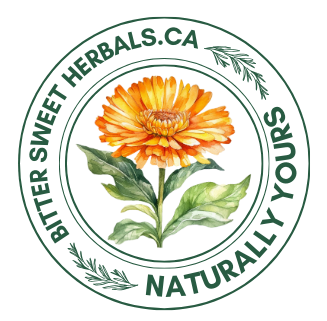STRESS: David Hoffmann says this: “Stress is the response of the body to any demand. Just staying alive creates demands on the body for energy to maintain life energy….. stress is a fundamental part of being alive and should not be avoided!” So having said that, it leads me to believe that there is not one person alive who doesn’t deal with stress to some degree or another and in no way will any two people have the same stress in their lives.
How many days of the week do you feel stress in your life?
Now before I get into much of the herbs of this article, I just want to say that self-reliance is about taking care of ourselves, regardless of circumstances, and we should all be striving to do this. Stress and anxiety – along with depression – are HUGE in the world today, and in a survival situation, or disaster situation, it will only rise higher. The number of people I personally know who take some form of antidepressants, or stress relief, insomnia, or other forms of medications, is frightening. Now I am not saying they shouldn’t take them, by any means. Take them and stay healthy, but what I am frightened for, is if they suddenly are not available, then what? So as we look to our lives right now, and to the future of what the possibilities are, plan and prepare accordingly. Below are some great herbs that will help and support the nervous system, along with many other body systems as you will see when you start studying. Read through this list, and do your own due diligence and decide what might you plan for – to become more self reliant with your family’s mental health and wellness. This article is just a starting point because the field of mental health and herbs is vast! But use this starting point as just that – a place for you to get inspired to help yourself.
Adaptogens: What they are and how they work – Ashwagandha (Withania somnifera), Astragalus (Astragalus membranaceus), Eleuthero (Eleutherococcus senticosus), Panax (Panax ginseng) or other Ginsengs, Schisandra (Shisandra chinesis)
What are adaptogens?
The term adaptogen was actually termed this by Soviet Scientists to describe herbs that produce an increase of resistance and vitality in our bodies. There are two really great books that I would suggest you read, let me link them here if you are an avid Amazon shopper – Adaptogens: Herbs for Strength, Stamina and Stress Relief and Healing Adaptogens: The Definitive Guide to Using Super Herbs and Mushrooms for Your Body’s Restoration, Defense, and Performance In these books, they explain that all adaptogens must meet three criteria, to actually be labelled as an adaptogen.
- They need to be nontoxic. They must have very minimal side effects and instead of you being able to overdose on them, they have what is called a “ceiling effect” like many vitamins and such do, in that once you hit that ceiling of what your body can use, the rest isn’t utilized by your body.
- They must be nonspecific. An adaptogen isn’t an herb that is used for a specific purpose. For example, I take Milk Thistle for my liver because it is a powerful liver regenerator. But an adaptogen effects many systems in your body, encouraging them all to stay in balance with each other. They are neither a stimulant or a relaxant.
- They must have a “normalizing” effect on the body. They contain many compounds, but depending on the person, and what that person needs at that time, it will work with the body systems and do it’s best to bring it to a normalizing state for that person.
How do they work?
Most adaptogens work by having a normalizing effect on your body. They help keep your body in balance. Let’s use the word “adapt”, as in they really do help your body adapt to the stressors in life.
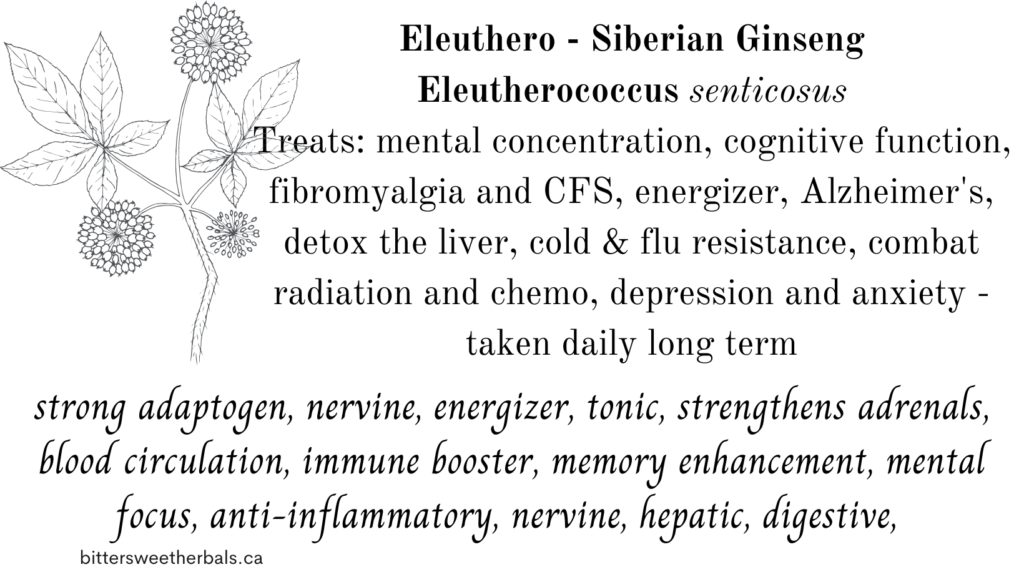
Eleuthero was the first actual herb to be labelled as an adaptogen. It was the herb that the Russian scientists studied in regards to stress and workload of people, and found it to be a powerful adaptogen. It is helpful for your endurance of your body as well as so effective with your brain and memory, mental fatigue and concentration. Hmmm sounds like we should all be taking it. 🙂

Ashwagandha (Withania somnifera) is one of my favorite adaptogens when it comes to stress and anxiety. It helps your body regulate the proper amount of cortisol it needs at the right times of the day. It is an herb that directly affects the liver, right up there with the top liver herbs like Milk Thistle. Now the really cool thing about Ashwagandha is that it has regenerative properties, and can “slow, stop, and even reverse damage to brain cells” (Healing Adaptogens pg 129) defitinely worth more of your study time, which we don’t have here. I take capsules daily.
There are many herbal nervines,nervine relaxants, and nervine stimulants that support stress and anxiety, even depression, and they often cross over to support and work with each. They are referred to mainly as nervines, but like we have learned so many times already, every herb has a variety of chemical properties, and can support and treat a variety of different health challenges.
Top herbs for stress, anxiety and depression:
Passionflower: Passiflora incarnata – Nervine, hypnotic, antispasmodic, anti-inflammatory, anodyne, hypotensive – One of my favorite herbs for stress. It is used for it’s sedative and relaxing properties, and it helps lower blood pressure, prevent tachycardia and relieve insomnia. I have a tincture of it on hand always, and it is so easy to combine it with other tinctures to create a great stress release formula. In face it is also used to treat muscle tension which is more often than not the side effect of stress and anxiety. Passionflower is often used to treat insomnia, and anxiety, and is often used in formulas for neurological conditions.
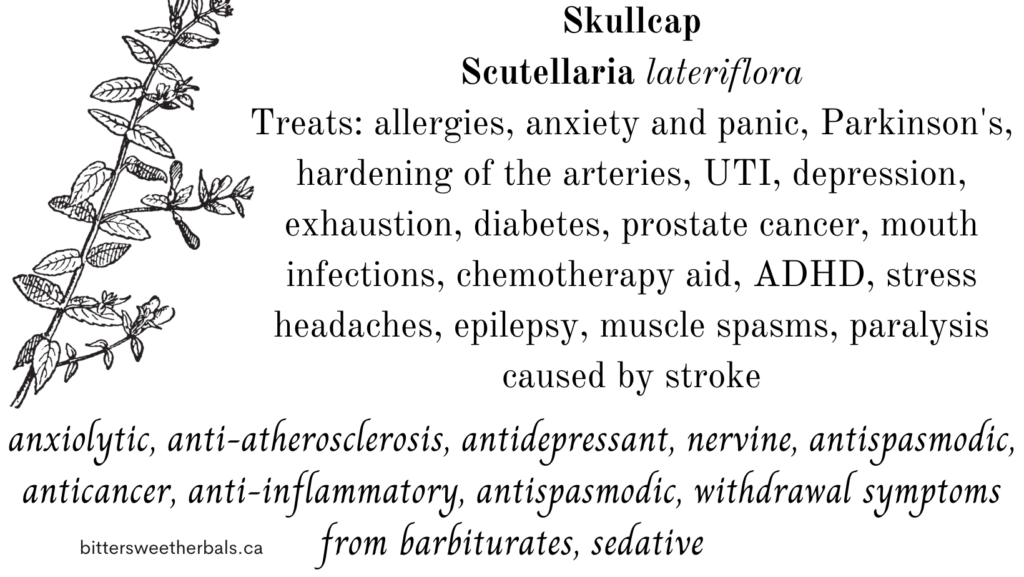
Skullcap: Scutellaria lateriflora – A strong nervine tonic, antispasmodic, hypotensive, nervine relaxant. David Hoffmann says this: “perhaps the most important contribution herbs can make to the whole field of neurology lies in their ability to strengthen and nourish the nervous system.” Nervine tonics do exactly this and skullcap is right at the top, along with St. John’s Wort (Hypericum perforatum) Skullcap “effectively soothes the nervous tension while renewing and revivifying the central nervous sytsem.” David Hoffmann
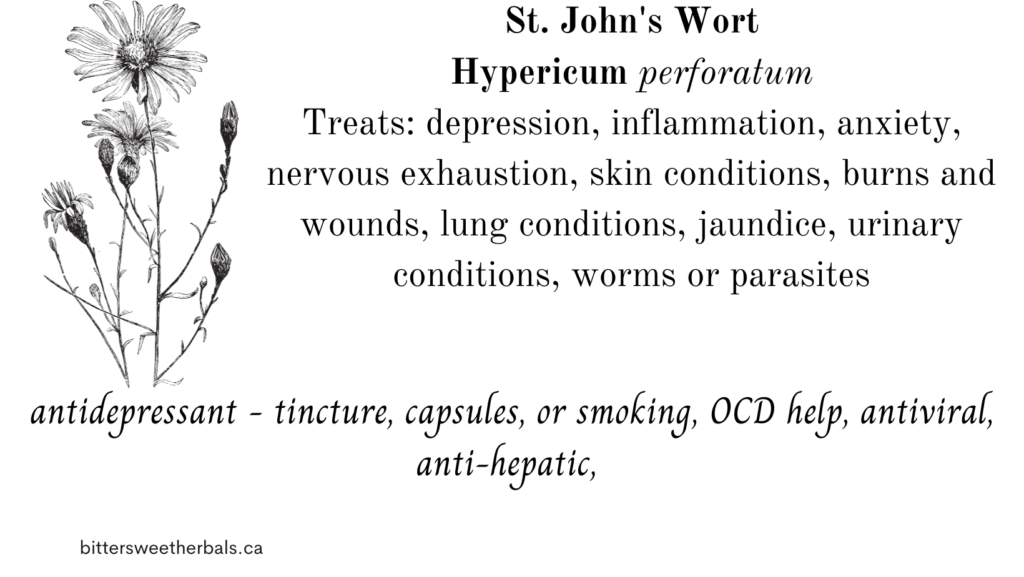
St. John’s Wort: Hypericum perforatum – One of my all time favorite herbs is St. John’s Wort. It is a powerful nervine, a strong anti-depressant, and a strong anti-inflammatory, astringent, vulnerary, and antimicrobial. It is a much studied herb, mostly when it comes to treating depression, or supporting a system against depression, and that is why it can be found on the shelves throughout the world, offering treatement for mild to moderate depression and anxiety. It has been shown through studies to enhance memory and cognition, and has been shown to help in the recover of brain trauma, injuries, strokes and such. It supports the liver in removing toxins, and just so many other things, that St. John’s Wort really is worthy of a study all on it’s own for the many things it can support. It can be taken long term without any damaging side effects. Taken internally it has sedataive effects, and I like to combine it with my Willow Bark Tincture as a very effective pain reliever. David Hoffman: “…a place in the treatment of neuralgia, anxiety, tension and similar problems. … St. John’s wort is helpful for neuralgic pain and will ease fibrositis, sciatica, and reheumatic pain.”
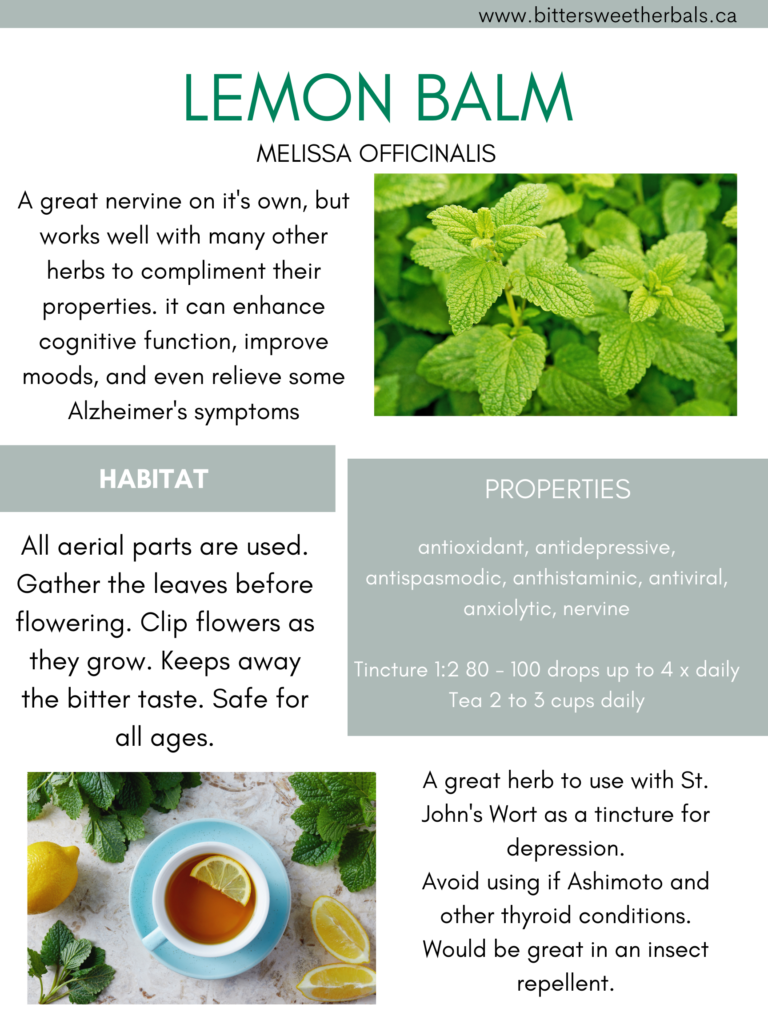
Lemon Balm: Melissa officinalis – Nervine, carminative, antispasmodic, antidepressant, diaphoretic, antimicrobial, hepatic. Mild antidepressant properties, relieving tension and stress reactions especially related to the digestive system. It is a trophorestorative for the nervous system, meaning it is a specific restorative herb for the nervous system. Here is the long list of just how good lemon balm is for you. Neuralgia, anxiety induce palpitations, insomnia, tension headaches, mild vasodilator, antiviral. It is one of those amazing herbs that are totally safe for children, and it tastes amazing as well. If you want to use it in a formula for children, then use vegetable glycerin and make it into a tincture that way and you will never have them fight you over taking it.
Motherwort: Leonurus cardiaca – nervine, emmenagogue, antispasmodic, hepatic, cardiotonic, hypotensive. It is “considered a specific for tachycardia (heart palpitations), especially when brought on by anxiety or other such causes. It may be used in all heart conditions associated with anxiety and tension.” David Hoffmann. I love the use of Motherwort. I don’t take it on a regular basis, but definitely when I am feeling anxious or sad, and I combine with another nervine, it relieves that stress feeling.
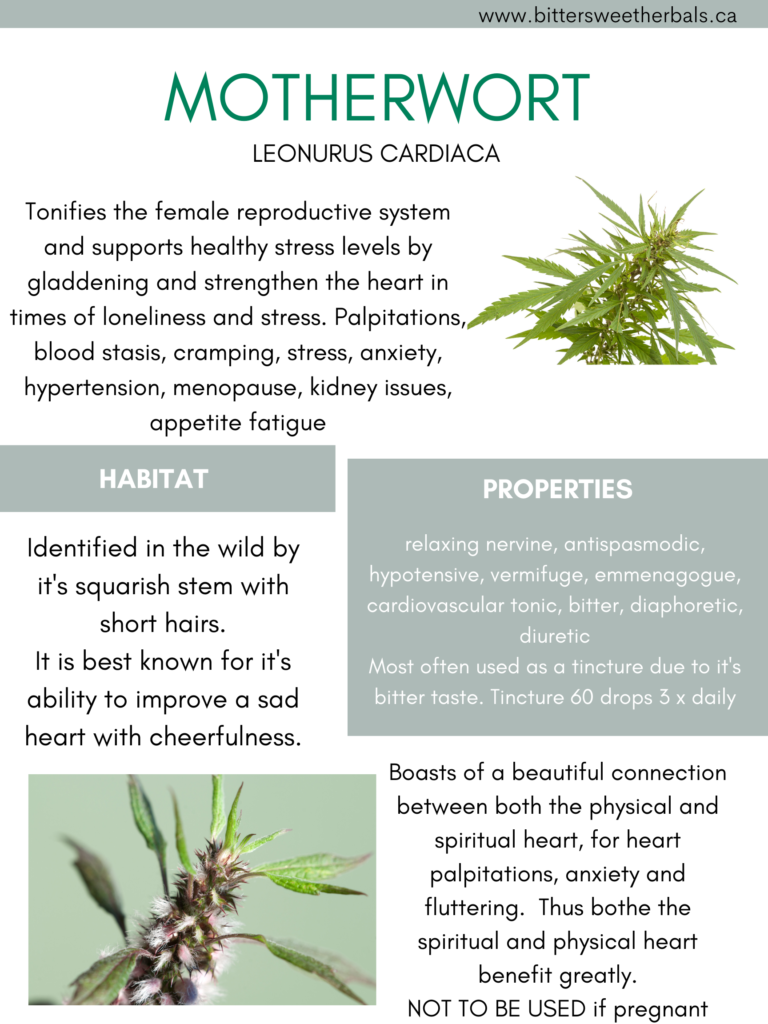
Tinctures or Formulas
Tincture of: Ashwagandha, Lemon Balm, Chamomile, Lavender, Skullcap, Passionflower is one that could be a stress bomb of a tincture! It will pack a powerful punch and will help you get through any anxious or stressful situation.
Tincture for Anxiety and Depression: Hypericum perforatum (St. John’s Wort), Melissa officinales (Lemon Balm), Actaea racemosa (Black Cohosh), and Passiflora incarnata (Passionflower) This can be combined in equal parts and taken 1 – 2 tsp up to 6 times daily. This comes from Dr. Jill Stansbury, ND in Volume 4 of her Herbal Formularies for Health Professionals. I just love her books full of medical and herbal science, advice, formulas, and so much information. Just a note on Black Cohosh – Actaea – it is a great helpful herb in support of fibromyalgia, which can be so painful. This strong body pain, is often accompanied by anxiety and depression, so keep Actaea in mind when you are making formulas.
A tincture that could be used for acute stress: Skullcap (Scutellaria lateriflora) and Valerian Root (Valeriana officinalis) – would be a great sleep tincture as well. Skullcap is a great nervine tonic and relaxant, as well as a antispasmodic and Valerian is a strong carminative.
Self-Reliance & Herbals
You have some great information in this article, which is a great starting place, and a sneek peek of what is to come in the Self Reliance With Herbals Course! Watch for it soon both here and on www.inchbyinchpreparedness.com
Please feel free to share your thoughts or comments. Please feel free to share on social media. You can even use the hashtags:
#bittersweetherbals, #themedicinecabinet, #choosingnature, #selfrelianceherbals, #herbalbusinesstalk #inchbyinchpreparedness #selfreliance #preparedness
